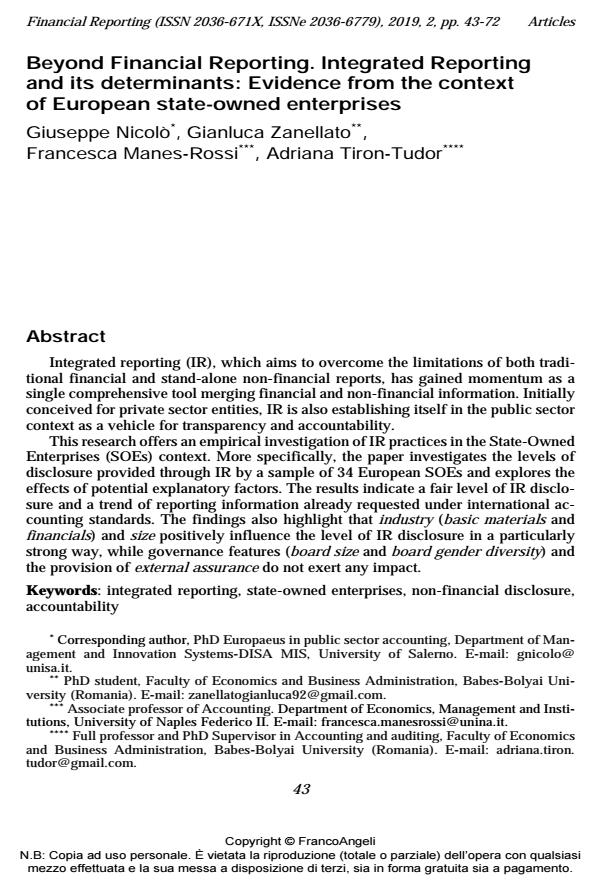Beyond Financial Reporting. Integrated Reporting and its determinants: Evidence from the context of European state-owned enterprises
Titolo Rivista FINANCIAL REPORTING
Autori/Curatori Giuseppe Nicolò, Gianluca Zanellato, Francesca Manes-Rossi, Adriana Tiron-Tudor
Anno di pubblicazione 2019 Fascicolo 2019/2
Lingua Inglese Numero pagine 30 P. 43-72 Dimensione file 191 KB
DOI 10.3280/FR2019-002003
Il DOI è il codice a barre della proprietà intellettuale: per saperne di più
clicca qui
Qui sotto puoi vedere in anteprima la prima pagina di questo articolo.
Se questo articolo ti interessa, lo puoi acquistare (e scaricare in formato pdf) seguendo le facili indicazioni per acquistare il download credit. Acquista Download Credits per scaricare questo Articolo in formato PDF

FrancoAngeli è membro della Publishers International Linking Association, Inc (PILA), associazione indipendente e non profit per facilitare (attraverso i servizi tecnologici implementati da CrossRef.org) l’accesso degli studiosi ai contenuti digitali nelle pubblicazioni professionali e scientifiche.
Integrated reporting (IR), which aims to overcome the limitations of both tradi-tional financial and stand-alone non-financial reports, has gained momentum as a single comprehensive tool merging financial and non-financial information. Initially conceived for private sector entities, IR is also establishing itself in the public sector context as a vehicle for transparency and accountability. This research offers an empirical investigation of IR practices in the State-Owned Enterprises (SOEs) context. More specifically, the paper investigates the levels of disclosure provided through IR by a sample of 34 European SOEs and explores the effects of potential explanatory factors. The results indicate a fair level of IR disclosure and a trend of reporting information already requested under international accounting standards. The findings also highlight that industry (basic materials and financials) and size positively influence the level of IR disclosure in a particularly strong way, while governance features (board size and board gender diversity) and the provision of external assurance do not exert any impact.
Parole chiave:Integrated reporting, state-owned enterprises, non-financial disclosure, accountability
- MODELING THE RELATIONSHIP BETWEEN INTEGRATED REPORTING QUALITY AND SUSTAINABLE BUSINESS DEVELOPMENT Marius-Sorin Ciubotariu, Marian Socoliuc, Veronica Grosu, Svetlana Mihaila, Cristina Gabriela Cosmulese Cosmulese, in Journal of Business Economics and Management /2021 pp.1476
DOI: 10.3846/jbem.2021.15601 - What drives the innovation in corporate social responsibility (CSR) disclosures? An integrated reporting perspective from China Yanqi Sun, Cheng Xu, Haoyang Li, Yuanyuan Cao, in Journal of Innovation & Knowledge 100267/2022 pp.100267
DOI: 10.1016/j.jik.2022.100267 - Is Integrated Reporting still relevant for the capital markets? Evidence from a voluntary setting—The case of environmental and social sensitive European companies Rareș Hurghiș, Adriana Tiron‐Tudor, Dan Ioan Topor, in Corporate Social Responsibility and Environmental Management /2025 pp.2019
DOI: 10.1002/csr.3049 - Integrating ESG issue into performance management system: An analysis of Italian Context Salvatore Principale, Daniela Cicchini, Luigi Andrea Carello, Rubina Michela Galeotti, in MANAGEMENT CONTROL 2/2024 pp.15
DOI: 10.3280/MACO2024-002002 - Board characteristics and sustainability reporting of state-owned enterprises: evidence from Sub-Sahara Africa Nana Konama Darteh, Gloria Fiorani, in Meditari Accountancy Research /2025 pp.466
DOI: 10.1108/MEDAR-08-2024-2607 - La relazione tra l'esperienza degli amministratori e il business plan: un'indagine empirica sulle imprese quotate in Italia Emmadonata Carbone, Sara Saggese, Fabrizia Sarto, in MANAGEMENT CONTROL 1/2023 pp.69
DOI: 10.3280/MACO2023-001004 - Do effective and sustainable corporate governance mechanisms affect the relevance of non‐financial information? Annamaria Zampella, Francesco Campanella, Luana Serino, Alessia Spignese, in Corporate Social Responsibility and Environmental Management /2025 pp.741
DOI: 10.1002/csr.2989 - Integrated Reporting in the Public Sector: Theoretical Foundations and Determinants of Quality Ana Zorio‐Grima, Andreea Hancu‐Budui, in Business Strategy and the Environment bse.70542/2026
DOI: 10.1002/bse.70542
Giuseppe Nicolò, Gianluca Zanellato, Francesca Manes-Rossi, Adriana Tiron-Tudor, Beyond Financial Reporting. Integrated Reporting and its determinants: Evidence from the context of European state-owned enterprises in "FINANCIAL REPORTING" 2/2019, pp 43-72, DOI: 10.3280/FR2019-002003